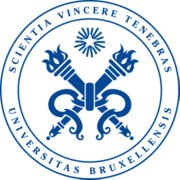Team:ULB-Brussels
From 2010.igem.org
| Line 1: | Line 1: | ||
<!-- *** What falls between these lines is the Alert Box! You can remove it from your pages once you have read and understood the alert *** --> | <!-- *** What falls between these lines is the Alert Box! You can remove it from your pages once you have read and understood the alert *** --> | ||
| + | |||
| + | {{ULB_Header_1}} | ||
{|align="justify" | {|align="justify" | ||
| Line 14: | Line 16: | ||
The actual use of dark fermentation to produce hydrogen attains very low yields, compared to other fermentative biofuel synthesis, e.g. methane or ethanol. We propose to design a genetically engineered E. Coli, with an improved natural hydrogen production pathway, using the organic compounds found in waste waters as substrate. In addition, we will implement various features to enable the strain to perform other tasks related to wastewater treatment, such as signaling metallic contamination, eliminating nitrogen compounds, or hindering hydrogen consumption by methanogenic bacteria. We will also set up a planned death system in order to prevent its proliferation outside the wastewater treatment plant.<br> | The actual use of dark fermentation to produce hydrogen attains very low yields, compared to other fermentative biofuel synthesis, e.g. methane or ethanol. We propose to design a genetically engineered E. Coli, with an improved natural hydrogen production pathway, using the organic compounds found in waste waters as substrate. In addition, we will implement various features to enable the strain to perform other tasks related to wastewater treatment, such as signaling metallic contamination, eliminating nitrogen compounds, or hindering hydrogen consumption by methanogenic bacteria. We will also set up a planned death system in order to prevent its proliferation outside the wastewater treatment plant.<br> | ||
| - | |||
|- | |- | ||
| | | | ||
| Line 24: | Line 25: | ||
<!--- The Mission, Experiments ---> | <!--- The Mission, Experiments ---> | ||
| + | <!-- | ||
{| style="color:#1b2c8a;background-color:#0c6;" cellpadding="3" cellspacing="1" border="1" bordercolor="#fff" width="62%" align="center" | {| style="color:#1b2c8a;background-color:#0c6;" cellpadding="3" cellspacing="1" border="1" bordercolor="#fff" width="62%" align="center" | ||
!align="center"|[[Team:ULB-Brussels|Home]] | !align="center"|[[Team:ULB-Brussels|Home]] | ||
| Line 34: | Line 36: | ||
!align="center"|[[Team:ULB-Brussels/Safety|Safety]] | !align="center"|[[Team:ULB-Brussels/Safety|Safety]] | ||
|} | |} | ||
| + | --> | ||
Revision as of 09:48, 9 August 2010

| Tuesday 3rd August 2010 : Team section updated ! | |
| Our team is composed of 10 people for the wetlab part, philosophers and economists will give their unique perspective on our project in synthetic biology. | |
|
In this ever more energy-dependent world, where fossil fuel ressources become scarce and raise environmental issues, the search for green energy sources is a growing concern in both civil and scientific communities. In this context, hydrogen turns out to be an interesting alternative. | |
 "
"

